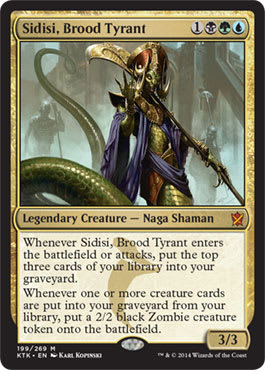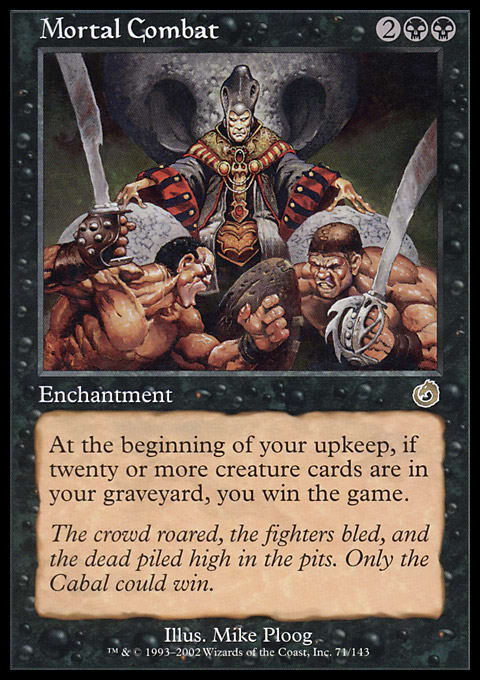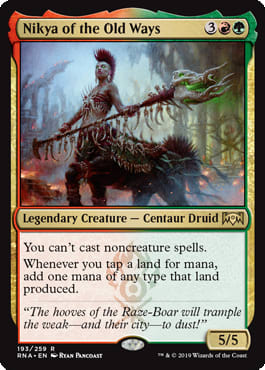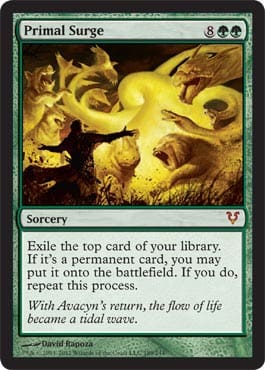
Winter Landscape by Caspar David Friedrich (1811). Chillerpillar by Suzanne Helmigh.
... run more answers.
I run a weekly Commander league and have seen lots of players come and go from our group. The other week I got into a long and animated discussion with Pierre Totari, a friend and Magic Judge who has been playing at a very high level in our league for a few years now. The conversation ranged from topic to topic but the biggest takeaway for me was that he was incredibly tired of seeing players upset at not being able to keep up with the more competitive Commander league players, but also not willing to run more answers in their decks.
I play in our League and in more casual EDH games with friends and family and have also struggled to try to get newer players to grasp the fine art of playing removal in Commander. It's not a simple thing. The way you should use removal varies based upon the types and tiers of decks you are playing against, the players you are faced with, and whether or not you are playing casually or competitively.
There is no one answer and there is no simple answer, but the bottom line is that most of you should probably be running more removal, or "answers" as some like to call them.
What is an "Answer"?
An "answer" is any Magic card that removes, stops or meaningfully delays another Magic card that you don't want to resolve or don't want to be affecting the battlefield.
A counterspell can be a great answer if you're in the right colors to run counters.
A spell that destroys a permanent might be an answer, but if that permanent is indestructible you'll realize you sometimes need to exile things or find a way to remove indestructibility.
If you don't have a way to exile a permanent and you can't destroy it, sometimes the solution will be to enchant it so that it loses its abilities. If it has hexproof or shroud you'll really have to get creative to get that aura onto the permanent you want to get rid of.
You can also have an "answer" that doesn't even come in the form of a Magic card. Use your words. Make deals with your tablemates and find ways to solve problems that don't cost you a card out of your hand or a permanent on the battlefield.
"If you blow up that Beastmaster Ascension, I'll swing my flyer at that planeswalker over there."
The problem with playing politics is that while it's fun, it's also unreliable. The ability to play your opponents against each other is something I love about Commander, but playing politics isn't something you can depend upon. What you can depend upon are the cards you have in your hand and the permanents you have on the battlefield.
Threat Assessment
It's tempting to think that you should just remove anything that might be a threat as soon as possible. That big Hydra on your tablemate's battlefield might seem scary, but if there are more than two players in the game it might be the wrong play. If you kill the Hydra, you are dramatically increasing the likelihood that the next big Hydra that player puts down will be sent your way, and that one might be even bigger. You're also losing the chance to play politics. Why not tell the Hydra's owner that you really want to kill it, but if he sends it at someone else you'll let it live?
"That's a pretty nice Hydra. It would be a shame if something were to happen to it..."
Let's take this Hydra situation a step further. You're at 40 life. The Hydra is a 10/10. The Hydra's owner happens to be the kind of player who responds to table politics by swinging at the guy or gal who is trying to make deals, so you threaten to remove it and he decides to swing it at you.
If you kill or exile the Hydra in response, you will be sending a message that you are true to your word, but you might also be making a bad decision.
Are there any combo decks at the table?
Are there any decks that run non-combo but equally lethal threats that can come out of nowhere?
I generally don't like to yell, but this next point is an important one.
THE ONLY LIFE POINT THAT MATTERS IS THE VERY LAST ONE.
You might be wise to cast your Swords to Plowshares on a 39/39 that is swinging at you when you are at 40 life, but in my Hydra example you'd only be going from 40 to 30 life. Lots of players would blow up the Hydra anyways because nobody likes to lose that big a chunk of their life total.
If you let the Hydra hit you, will they be satisfied with that and swing at someone else next turn?
If you use a removal spell on the Hydra, will another player combo off with a wincon that you could have stopped with the "answer" you just used to avoid taking 10 damage?
If you remove one threat, another will surely come along.
You're not playing against a full table of group hug players and all of your tablemates are trying to kill you in one way or another. It's the nature of the game. Your job isn't to stop every threat, but to save your removal for the threats that really matter. Sometimes that means getting rid of a non-lethal Hydra. Every table will present a unique combination of decks and board states and only through lots of play and plenty of mistakes will you learn how to best assess the threats your opponents will throw at you.
Competitive Removal
In competitive play, it's safe to say that you probably shouldn't be worrying too much about your tablemates' feelings.
You are playing cEDH or you are at least playing Commander in an environment in which there is something to be gained through winning. You might stand to win tickets or booster packs, or you might just be winning "bragging rights" at your LGS. Regardless of what is at stake, I think the approach to using removal in a competitive game is and should be different than the approach to using it in a casual game.
What I wrote above regarding threat assessment applies to playing competitively, but I think you actually need to take it up a notch.
You're in a competitive game. You've got an opponent who is a little mana-screwed but they drew into a Sol Ring or Mana Crypt and they've just barely gotten the mana together to cast their commander. Their deck is reliant upon what their commander can do, but resolving it isn't going to win the game that turn and they might not threaten a win on the next turn if their commander sticks around. Everyone's deck is capable of winning the game, but this poor soul isn't likely to be a threat anytime soon.
Do you counter their commander?
The answer depends an awful lot on what other players at the table are playing and what they are doing. It also depends upon what you've got in your hand and how close you are to seeing your deck do what it was built to do.
I would suggest that if you're in the situation described above, you might not only counter their commander - you might also want to BLOW UP THEIR MANA ROCK.
Two cards to pretty much remove a player from the game might seem like a lot, but you're basically killing someone - they just don't happen to be dead yet. They might draw into enough lands and acceleration to get their commander out again but with lots of fast decks at the table it's unlikely that the game will last that long.
But doesn't that just ruin the game for the player who was mana-screwed?
Of course it does. You're playing competitively. You've willingly entered into a game in which the sole object is to win. Does it increase your chances in the game to have an opponent set back so far that they are unlikely to pose a serious threat for the rest of the game? If the answer is yes, then maybe neutering them is the right play.
Does expending the resources to counter a commander AND blow up a mana rock open the door for someone else to win?
Competitive decks can win out of nowhere. If you're going to blow through a counterspell and artifact removal, you should probably have a third answer in hand in case someone else at the table tries to go for the win in the wake of the brutal smack-down you just unleashed.
The secret about cEDH games is NOT that the games always end after 10 minutes and nobody really has any fun.
The secret is that cEDH players run a ton of removal and love the tense back-and-forth of trying to stop each other from winning. They spend so much time and energy learning proper threat assessment that competitive players can be very frustrating for casual players to play against even if the competitive player isn't playing a true cEDH deck. They value removal because a key part of their win con is keeping you from winning first. That's an approach that many casual players take a long time to fully appreciate.
Casual Removal
If playing removal in a competitive environment is all about winning, does that mean that you shouldn't run removal in your casual decks?
Short answer - no.
Long answer...
NOOOOOOOOOOOOOOOOOOOOOOOOOOOOOOOOOOOOOOOOOOOOOOOO.
Casual Commander is and will always be about fun.
Competitive EDH is also about fun, but the focus is never on trying to make sure that your tablemates are having fun. The focus is on winning and the fun is in having everyone on board and playing with a competitive mindset.
The casual mindset is about winning, but also about trying to have EVERYONE enjoy the experience.
I think that can mean playing removal in a slightly different way.
Since you are still trying to win the game, you still need to run removal. You often won't know how powerful your tablemates' decks are until the game is well underway, and often a single game isn't enough to give you a full understanding of what someone's deck can do. There are "casual" decks that run combo wincons and can win out of nowhere if they draw into the right stuff. Some of them even run ways to protect their win con and ways to tutor up combo pieces. If you don't like getting "pubstomped" you have to run answers and you'd be wise to play as if your opponents might win the game at any point in time.
It's not fun for most casual player to lose out of nowhere. You run answers to try to minimize the chances of that happening. You might also whine and cry about how their decks are overpowered and un-fun and make a spectacle of yourself. I hope you don't, but I don't know you. What I do know is that it's empowering to have an answer to a problem, and it will genuinely make you feel better to know that even if the answer wasn't in your hand when you lost the game, you at least had it in your deck. You weren't completely and utterly unprepared when you got blindsided by someone's win con even if you weren't able to stop it.
Let's look at our 10/10 Hydra example again. In a casual game, you might be tempted to preemptively destroy it, but all the arguments I made earlier still stand. You don't know who it's going to be swung at and you don't want to make an enemy any earlier than you need to.
In casual EDH I'd suggest that there is another thing to consider.
Will blowing up that Hydra "ruin the game" for that player?
As I wrote the above question, I have to admit that it felt a little ridiculous, but it's still worth asking.
Let's say the Hydra player had a really, really bad day. They lost their job. Their girlfriend or boyfriend dumped them. They hadn't done anything in the game until that point and playing this big dumb Hydra was the first thing of any substance they had done all game long.
The competitive mindset would dictate that none of those things really matter. You "honor the game". If you want to blow it up and it's the "right" play, you blow the damn Hydra up. It's unlikely you'll see a Hydra in a truly competitive game anyways, but cEDH and casual Commander isn't a black and white thing. You can see all kinds of unexpected things in competitive environments if you play enough, and the bottom line is that feelings don't matter. You play the game and in theory you set your feelings aside.
In a casual game, I probably wouldn't blow up the Hydra until I had no real choice in the matter. If the Hydra player was having a bad day, I might go out of my way to let it stick around longer that I probably should. That's how I roll, but that doesn't mean that you have to play that way. You can be as cutthroat as you like in a casual environment, but it's also OK to consider the experience and enjoyment of your tablemates when you assess threats. You'd never do that in cEDH but in casual play I think it can be part of the social contract. You want everyone to have fun, and every once in a while it's OK to go easy on someone if it feels like the right thing to do.
It goes without saying that I would probably not counter a friend's commander and then blow up their mana rock to put them well and truly out of the game in a casual environment. They were already mana-screwed so they were probably already a little frustrated and I genuinely want everyone to enjoy a casual game of Commander.
That doesn't mean you bend over backwards and let them do whatever they like.
It means using removal responsibly, with consideration for both your chances of winning and the experience of your tablemates.
Playing To Win and Playing Not To Lose
If the golden rule of competitive play is that you have nothing to apologize for if you're playing to win, I think the casual corollary would be that you have nothing to apologize for if you're playing not to lose.
What does "playing not to lose" even mean?
If you are playing in a casual environment you should absolutely run answers and removal.
So long as you're using those spells to keep from dying, nobody has any right to complain.
Your friends might find you incredibly frustrating to play against, but they will hopefully be more likely to admire you and the way you play than to hate your playstyle and not want to play with you.
Can you use your answers to avoid damage even if it wouldn't kill you?
Absolutely.
Can you use your answers to punish players who didn't do what you wanted them to do, or who were being overly aggressive toward you?
Sure.
Leveraging the threat of using removal spells is an essential part of playing politics in Commander.
You're going to have more fun if you're able to defend yourself from threats and you're in the game longer. You're going to feel better about your games if you know you've got answers even if you don't happen to draw into them. You'll still have frustrating losses and you'll still get blindsided by combo wincons but the only way to get better at using removal and assessing threats is by using removal and assessing threats.
The Exceptions to The Rule
If "the rule" is that you should be running removal, and you probably should be running more removal, it's safe to say that there is always an exception to the rule. There are decks that might be stronger if they included a responsible number of "answers", but I can see why they don't.
In competitive play these removal-light decks are called "glass cannons". They are built in such a way that they are incredibly explosive (hence the "cannon" part) but also incredibly fragile (hence the "glass" part).
I had a Narset, Enlightened Master deck that ran a ton of extra turns and combat steps. I had some removal but not as much as I probably should have run because I wanted to maximize the chances of hitting "good stuff" when Narset got her attack trigger. The deck was strong but fragile. It could win games out of nowhere, but had trouble when faced with too much counter magic or early board wipes. It was fun, but its fragility make it frustrating. I would have a couple of amazing games where everything went right and then a bunch of games where she didn't do well at all.
I think it's OK to build and play "glass cannon" decks so long as you're honest with yourself about what you're doing. Don't be surprised when the deck falls flat on its face or folds in the face of a modest amount of resistance. You built your glass cannon. Enjoy it for what it is. I should also point out that a true cEDH aficionado might suggest that a glass cannon deck isn't really a cEDH deck because of its fragility.
In casual play there are decks that really want a skewed dispersion of card types in their decklists and that can lead to much, much less room for answers.
One example from my own deck library is my Sidisi, Brood Tyrant deck. I built the deck in part to try to eventually get a win using the enchantment Mortal Combat. The deck wants to self-mill, but it wants to self-mill a little at a time to maximize the chances that I'll get a bunch of Zombies from my commander's ability. Mortal Combat will let me win the game if I can get to my upkeep and I have 20 or more creatures in my graveyard. In order to maximize the chances of getting to that magic number of 20, and in order to maximize the chances of getting Zombies when I mill myself, I'm running a ridiculous number of creatures. All those creatures means way less room for non-creatures. That means I have to run my answers in the form of creatures, which isn't impossible but which is definitely a limiting factor. I'm still running answers but they're not at instant speed and there are definitely not as many of them.
Another example I can share with you is my Nikya of the Old Ways/Primal Surge deck. The current build of the deck wants to be able to cast and resolve Primal Surge and put my entire deck onto the battlefield. If I do that I should be able to kill the table, but limiting myself to only one non-permanent card in the 99 again means that I'm going to have to run my answers as creatures. Acidic Slime, Reclamation Sage, and a host of other creatures are happy to step up and do their job, but it does make it harder to stop someone else from winning when you're building your deck that way.
If you're building a deck that has some weird constraint or restriction, you're probably not playing competitive EDH. That doesn't mean you should just ignore removal. Run answers and if your deck isn't performing well enough, run more answers. Look at how you lose and what sort of challenges the deck struggles against and pick your answers carefully. Your deck and your ability to pilot it can and should evolve and improve, but that will only happen if you work at it. Trust me - it will be worth the time and effort you put in.
Final Thoughts
Running removal in your decks doesn't mean not running all of the other things a Commander deck wants to have. You still need ramp and draw. You still need a way to win the game. You should still try to win the game if you're like most players and want to try to win games. You just need to remember that one of the most important things about building a Commander deck is setting it up to be able to stop other players from winning first.
If you play competitively, you probably already know all about removal. If you play casually, I hope I've inspired you to go back and rework some of your decks. Once you've gotten a little practice you'll find that you are going to win more games and have a lot more fun if you're able to answer threats, remove problems, and survive a little longer.
If you find that you are completely dominating play and your casual playgroup is constantly playing archenemy with you always playing the part of the enemy, consider building a deck or two that isn't quite as powerful.
Everyone wants to have fun when they play Commander and never winning isn't much fun. You can and should help your friends improve their game and improve their deck-building so they aren't pushovers. If you're playing casually, you can and should also be willing to play some decks that are going to be easier for them to defeat, whether that means borrowing their decks or building your own decks with restrictions that make it harder for you to dominate play.
Before I sign off I would like to thank Pierre Totari as well as all the players out there who actively try to help less experienced players to improve their decks and become better players. They've been telling you to run more answers all along and they're right. Listen to them. Stopping other players from winning will give you a little more time to try to get your own wincon online, even if it's just the old-fashioned approach of slowly beating them to death over many turns.
If you've got friends you play with who haven't yet learned to run boardwipes, removal, and counterspells in their decks, feel free to share this column with them. Heck - you can even tag them when you share it to really throw them under the bus. If they'll finally get the message and start putting up more of a fight in your games, it might be worth it; and, if nothing else, it'll be amusing.
Thanks for reading and I'll see you next week!

























